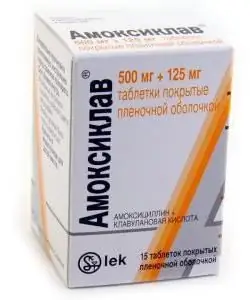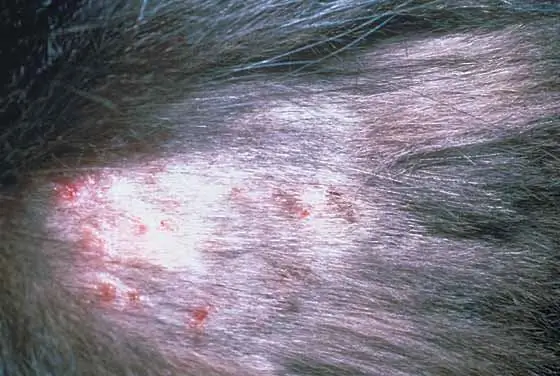2026 Author: Priscilla Miln | miln@babymagazinclub.com. Last modified: 2025-01-22 17:55:27
Cats are rather curious animals, which is why they often get injured and catch various contagious and non-contagious diseases. It is important for the owner to know what diseases are most common in cats, what are their symptoms and how to cure the cat.
Signs of feeling unwell
It is important to note changes in the cat's well-being in time, because only timely assistance can be the most effective.
Signs that should alert the owner:
- Rejection of food or gluttony. It is worth noting that seasonal changes in the pet's appetite are possible. Usually, by winter, cats gain weight, and therefore eat more, by the summer, their appetite drops a little, and they lose weight. And yet, a sharp refusal to eat may indicate a pet’s illness, as well as a sudden, unreasonably awakened strong appetite.
- Apathy, lethargy. Cats are usually pretty lazy creatures. As they age, they play less and sleep more. However, a he althy animal should still have periods of activity when it rushes around the house, sits on the window and looks at birds, hunts. If the cat has become inactive, constantlysleeping, passive, not interested in the outside world, this is a reason to sound the alarm.
- Problems with urination, blood in the urine.
- Vomiting and diarrhea. Sometimes cats may vomit for no reason - this is how they clean their stomach from ingested wool. Still, you should keep an eye on your pet. If the vomiting does not stop, the animal has severe diarrhea, it is necessary to take the pet to the doctor.
- Discharge from nose and eyes.
- Increased body temperature. Normal body temperature in cats is 38-39 degrees.
- Shortness of breath, wheezing, cough.

Street cats are quite often injured in fights with other cats or dogs. How to cure a cat in this case? If the wound is small, it can be treated with hydrogen peroxide. For more serious injuries - fractures, large lacerations, internal injuries - you should contact your veterinarian as soon as possible. The doctor must stop the bleeding, treat the wound, fix the broken limb. Usually the animal is injected with an anesthetic. After that, it is advisable to leave the animal in a dark, quiet place where no one will disturb him.
Let's list the main diseases of cats, their causes, symptoms and tell you how to cure a cat at home.
Infestation
A fairly common problem, especially for street cats, is parasitic infestation. Cats can pick them up from other animals, through food, even from the owner's street clothes and shoes.
Very often cats, especially street cats, are sick with worms. Main symptoms: the animal is a loteats but does not get fat, the cat's stomach swells, activity decreases, long white worms can be found in the feces that wriggle and move.

How to cure a cat? It is necessary to purchase anthelmintic drugs in a veterinary pharmacy, it is advisable to consult a veterinarian before buying. The medicine should be given according to the weight of the animal. After the first dose, it is advisable to give anthelmintic drugs again in a few days and see if the worms come out with feces. Treatment can be completed when no parasites are found in the stool. It is desirable to give anthelmintic preparations prophylactically to animals in accordance with the instructions. And this applies to domestic cats as well.
Outdoor cats get fleas very easily. If the cat is constantly itching, his activity drops, he is constantly in suspense, it is worth checking his coat for fleas. You can get rid of fleas with special shampoos, drops and collars. It must be remembered that fleas can lead the animal to anemia, infection, skin wounds from claws.
Digestion problems
Quite often, owners feed domestic cats from the table, that is, they give them food that they eat themselves. This is absolutely the wrong approach. The body of cats is fundamentally different from the human, and therefore their food should be different. As a result of improper feeding, cats may develop problems with the stomach and intestines, kidneys, and urinary system. It is worth remembering that a cat can be fed with natural food, but only in accordance withspecially formulated diet, which should contain all the vitamins, minerals and useful components necessary for the animal.
Another common problem that can cause digestive problems is feeding poor quality feed. Widely advertised inexpensive feed in the economy segment can lead to problems with the liver, kidneys, stomach and intestines. Cheap cat food often causes diarrhea and vomiting.
Diarrhea and vomiting in a cat may also indicate that the animal has been poisoned. The reason may be: poor-quality, rotten food, eaten poisoned mouse or rat, poisoning with household chemicals. In this case, it is necessary to see a doctor as soon as possible, otherwise the consequences may be irreparable.
Disruption of the nervous system

Main symptoms of nervous system problems:
- sudden aggression;
- paralysis of limbs or whole body;
- neurotic states: sudden tantrums, constant depression, a radical change in behavior;
- curvature of the spine.
Problems with the nervous system can occur due to trauma, congenital abnormalities, hormonal failure, or accompany other diseases.
In the event of the first symptoms, seek immediate medical attention.
Urolithiasis
Urolithiasis is a very common and dangerous pathology in cats. Due to improper functioning of the kidneys, sand and stones form in them, which clog the urethra. Urine cannot come outbecause of what happens intoxication of the body of the animal. This problem is especially common in neutered cats.
Main signs of urolithiasis:
- painful urination;
- the animal sits on the tray for a long time and cannot urinate;
- blood in urine.

Causes of urolithiasis:
- Feeding poor-quality dry food and lack of constant access to clean drinking water.
- Feeding fish often.
- Excess weight, which causes disturbances in the functioning of internal organs.
Urolithiasis can cause rapid death of the animal. At the first symptoms, it is urgent to take the pet to the doctor.
How to cure a domestic cat? The cat may need surgery to remove stones from the urethra. After that, the doctor will prescribe medication and a special diet. It is necessary to strictly adhere to all the recommendations of the veterinarian, since urolithiasis does not just go away and in case of violation of the treatment regimen and diet, it may worsen.
Eye problems
During street fights, cats very often injure each other's eyes. The main symptoms are: blood flows from the eye, the cat cannot open the eyelid, the animal screams in pain, damage is clearly visible on the eye. How to cure a cat? In this case, you should seek medical help as soon as possible. He will clean the eye, check its condition. If the eye does not have to be removed, the veterinarian will prescribe injections, and the affected organvision will need to be flushed several times a day.

Swelling of the eye, clouding of the pupil, constant watery eyes or pus that comes out can indicate a variety of diseases. Most often, cats suffer from conjunctivitis, glaucoma, cataracts. Only a doctor can make an accurate diagnosis by taking the necessary tests. How to cure a cat in this case? The doctor may prescribe antibiotics and other medicines. The eye at home will have to be washed out of pus, eye drops or prescribed injections.
Infection
Another common problem in cats is lichen. The animal may develop bald patches, the cat itches a lot, red spots and scales appear on the skin. Lichen is an extremely contagious disease, including for humans. Mold fungi provoke its appearance. Initially, the disease is localized on the tail, head and ears, and if left untreated, it spreads to the whole body.
How to cure lichen in a cat? It should be understood that all the symptoms indicating lichen do not yet guarantee that this is not some other disease. Therefore, at first, lichen must be correctly diagnosed. The veterinarian may take a scraping from the cat's skin and send it for analysis, or use a Wood's lamp. When making a diagnosis, the doctor must vaccinate the animal.
How to cure cat lichen at home? It is worth remembering that lichen is extremely contagious, and therefore it is better to touch the animal only with gloves. It is advisable to temporarily isolate the cat from people and other animals. For treatment, you can use antifungal ointments, baths withlime sulfide, tablets ("Itraconazole", "Terbinafine", "Griseofulvin").
It is possible to single out other infectious diseases that cats often suffer from: cat distemper, rabies, coronaviruses, calicivirus. The main symptoms of an infectious disease are: high fever, vomiting and diarrhea, apathy, drowsiness. Whether it is possible to cure a cat depends only on the accuracy of the diagnosis and how quickly the animal receives medical care. In the case of infectious diseases, minutes often count.
Prevention

Let's highlight the main methods of preventing diseases in cats:
- feeding only high-quality, balanced feed;
- food must be selected in accordance with the age and characteristics of the cat (for example, it is advisable to buy specialized food for castrated animals);
- constant availability of open access to clean drinking water;
- annual vaccinations even for cats that don't go outside;
- periodic check-ups of the animal at the veterinarian.
Thus, often an animal that is kept in the right conditions and eats high-quality feed has a stronger and disease-resistant immunity. It is worth remembering that self-treatment in case of illness can further aggravate the situation, therefore, at the first opportunity, it is advisable to show a sick pet to a specialist.
Recommended:
Fish diseases: treatment and prevention. Diseases of aquarium fish

Fish diseases can be caused by a variety of factors, including: improper housing conditions (in the case of aquarium fish), infections transmitted from other fish, and also caused by single- or multi-celled parasites
Cat coughs: causes and consequences. Cat diseases: symptoms and treatment

How much joy our beloved pets bring us! Your affectionate fluffy (or smooth-haired) four-legged friend meets you from work, purrs with happiness that he has waited for his beloved owner, and in the evening tries to get on his knees and watch TV with you. Idyll… And suddenly you notice that the cat seems to be coughing. Is your pet sick?
Ferrets: diseases, possible causes, symptoms of the disease, treatment, prevention and advice from veterinarians

Recently, more and more often, fans of pets give birth to ferrets in houses and apartments. Animals are undemanding in content, mobile, intelligent and cheerful. And yet there are some nuances that you need to know if you are going to make such a friend. Despite strong immunity, there are a number of ferret diseases that attentive owners should be aware of
Skin diseases in cats: a list of diseases, a description with a photo, causes and methods of treatment

The skin of pets is regularly exposed to various negative influences, they are bitten by fleas, ticks and various blood-sucking parasites. As a result of this, various skin diseases in cats, as well as problems with coat, can occur. It is very important to accurately diagnose and treat. This will prevent the occurrence of dangerous complications
Kidneys during pregnancy: possible complications, symptoms of diseases, methods of treatment, prevention

Kidneys during pregnancy, like all organs at this time, work in an enhanced mode. The body of a future mother can fail, which happens quite often with the kidneys. In this article, we will talk about the work and diseases of this organ during pregnancy, find out why the kidneys can start to hurt or increase

